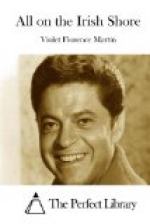Croppy was firm and circumstantial in laying the blame on me and the sketching umbrella.
“Sure, I seen the horse wondhering at it an’ he comin’ up the hill to us. ’Twas that turned him.”
The dissertation in which the Dean’s venerable coachman made the entire disaster hinge upon the theft of the breeching was able, but cannot conveniently be here set down.
For my part, I hold with Julia.
“’Twas Helayna gave the dhrink to the Dane’s coachman! The low cursed thing! There isn’t another one in the place that’d do it! I’m told the priest was near breaking his umbrella on her over it.”
“MATCHBOX”
It was the event of Mr. John Denny’s life that he valued highest. It is twenty years now since it took place, and many other things have happened to him, such as going to England to give evidence in the Parnell Commission, and matrimony, and taking the second prize in the Lightweight Hunter Class at the Dublin Horse Show. But none of them, not even the trip to London, possesses quite the same fortunate blend of the sublime and the ridiculous that gives this incident such a perennial success at the Hunt and Agricultural Show dinners which are the dazzling breaks in the monotony of Mr. Denny’s life, and he prized it accordingly.
Mr. Johnny Denny—or Dinny Johnny as he was known to his wittier friends—was a young man of the straightest sect of the Cork buckeens, a body whose importance justifies perhaps a particular description of one of their number. His profession was something imperceptibly connected with the County Grand Jury Office, and was quite over-shadowed in winter by the gravities of hunting, and in summer by the gallantries of the Militia training; for, like many of his class, he was a captain in the Militia. He was always neatly dressed; his large moustache looked as if it shared with his boots the attention of the blacking brush. No cavalry sergeant in Ballincollig had a more delicately bowed leg, nor any creature, except, perhaps, a fox-terrier interviewing a rival, a more consummate swagger. He knew every horse and groom in all the leading livery stables, and, in moments of expansion, would volunteer to name the price at which any given animal could be safeguarded from any given veterinary criticism. With all these not specially attractive qualities, however, Dinny Johnny was, and is, a good fellow in his way. His temper was excellent, his courage indisputable; he has never been known to give any horse—not even a hireling—less than fair play, and a tendency to ride too close to hounds has waned since time, like an Irish elector, has taken to emphasising himself by throwing stones, and Dinny Johnny, once ten stone, now admits to riding 13.7.




